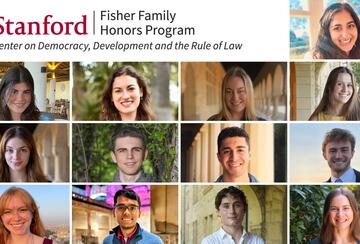News

Beatriz Magaloni, the Graham H. Stuart Professor of International Relations, presented her latest research during a CDDRL seminar talk.

The Parliament of Mongolia is convening the Trans-Altai Sustainability Dialogue on April 25-26, 2024, along with Stanford University’s Walter H. Shorenstein Asia-Pacific Research Center and the Ban Ki-moon Foundation For a Better Future as co-hosts. The forum will bring together experts across academia, civil society, and government from the United States and Asia to share policy pathways and best practices to strengthen the capacity of institutions to achieve the targets for Sustainable Development Goal 16 of the 2030 Agenda for Sustainable Development.
Researchers “spill the tea” on why gossiping may promote social cooperation.
The Bradley Prize is awarded annually to individuals whose “extraordinary work exemplifies the Foundation’s mission to restore, strengthen, and protect the principles and institutions of American exceptionalism.”
![[Left to Right] Dorit Banet, Galit Cohen, Tareq Abu Hamed, Victor Weiss](https://fsi9-prod.s3.us-west-1.amazonaws.com/s3fs-public/styles/360x244/public/2024-04/israel_environment_3-8_hero.png?h=c4d9845d&itok=KQqkxsw3)
Environmental experts examined the challenge of sustainable restoration and preserving environmental quality for the future of Gazans and residents of the region in the wake of the Israel-Hamas War.
Talking about other people behind their backs can be an important way of encouraging cooperation, according to a new theoretical model.

Following the disappointing performance of South Korea’s ruling People Power Party in the April 10 parliamentary elections, Stanford sociologist and APARC Director Gi-Wook Shin analyzes the implications of the election outcomes for President Yoon’s domestic and foreign policies and Korean society and economy.
The newly released report explains the benefits of U.S.-China scholarly cooperation to the two societies and the world at large, identifies the obstacles to greater exchanges, and outlines practical strategies for overcoming these challenges.
In a new study by members of Josh Salomon's Prevention Policy Modeling Lab, the researchers found profound racial and ethnic disparities that are stalling overall progress against TB.

A multinational Deliberative Poll unveils the global public's nuanced views on AI chatbots and their integration into society.

The award celebrates individuals who have demonstrated exceptional dedication and impact in advancing social equity, championed the cause of social justice, and inspired meaningful change in their communities.
We are thrilled to welcome thirteen outstanding students, who together represent fourteen different majors and minors and hail from eight different states and two countries, to our Fisher Family Honors Program in Democracy, Development and the Rule of Law.

Honoring the Legacy of Makoto Iokibe
Honoring the Legacy of Makoto Iokibe
Makoto Iokibe was an esteemed diplomatic historian best known for his pioneering studies on the U.S. post-World War II occupation of Japan, but his influence extended beyond the scholarly world.
SHP's Sara Singer, a member of the Lancet Psychiatry Commission, calls for closing the knowledge gap in mental health research.
The often hidden burdens of long COVID is the subject of the latest Stanford Health Policy Forum, with researchers likening it to the early days of chronic fatigue syndrom.
Rice, who most recently served as President Biden’s domestic policy advisor, will have simultaneous appointments across FSI, as well as at Stanford’s Human-Centered Artificial Intelligence institute.

In its fourth year, "Ethics, Tech + Public Policy for Practitioners," taught by Rob Reich, Mehran Sahami, and Jeremy M. Weinstein, experiments with setting up long-term communities of professionals interested in responsible tech governance.

The program will explore policy-relevant approaches to address Taiwan’s contemporary economic and societal challenges and advance U.S.-Taiwan partnerships.

The results of Iran's most recent election are a serious sign of defeat for Supreme Leader Ali Khamenei, Dr. Abbas Milani tells Michael McFaul on the World Class podcast.

Harvard University Professor of Government Alisha Holland explains how the advent of public-private partnerships has shifted politicians’ orientation toward infrastructure projects.

How Spammers, Scammers and Creators Leverage AI-Generated Images on Facebook for Audience Growth
A new preprint paper looks at the ways Facebook Page operators are using AI image models to create surreal content and generate online engagement.

Amid North Korea’s increasing provocations, APARC’s Korea Program hosted three experts — Robert Carlin, Victor Cha, and Siegfried Hecker — to consider whether Pyongyang plans to go to war.

The Fred Riggs Award for Lifetime Achievement in Public Administration is an academic award given annually by the Section on International and Comparative Administration of the American Society for Public Administration.














